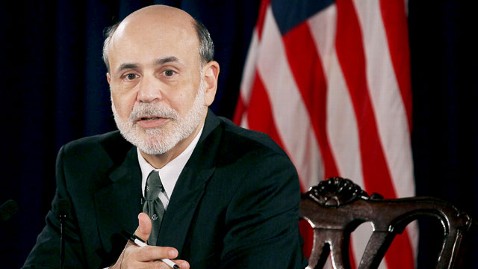Bernanke: Economic Growth Likely ‘Frustratingly Slow’

(Getty Images)
Federal Reserve chairman Ben Bernanke said today that the pace of U.S. economic growth is likely to be “frustratingly slow.”
Bernanke said factors such as high unemployment and unexpected events including the European debt crisis, rising oil prices and the natural disasters in Japan have affected growth this year.
“I fully sympathize with the notion that the economy is not performing as it should be,” Bernanke told reporters at a news conference this afternoon.
However, he defended the Fed’s monetary policy, including focusing trillions of dollars in quantitative easing stimulus and keeping interest rates at levels close to zero. Had the Fed not deployed its economic toolbox, Bernanke said unemployment, currently at 9.1 percent, “would be much higher.”
The chairman said other arms of government should do their part to boost employment.
“In a polite way, he was saying it’s the other branches of government who can help solve economic problems long term,” said Doug Roberts, chief investment strategist for Channel Capital Research. “He was saying the Fed stabilizes the situation while they’re getting their act together.”
Bernanke acknowledged that low mortgage rates the Fed has achieved have not been “as effective as we had hoped.”
Mortgage rates are at their 60-year lows, though the housing market remains depressed. Thirty-year fixed-rate mortgage rates averaged 4.10 percent for the week ending Oct. 27, down from the previous week when it averaged 4.11 percent, according to Freddie Mac.
The Federal Reserve’s Federal Open Market Committee concluded a two-day meeting and released a statement saying it will keep the target range for the federal funds rate, the overnight borrowing rate of reserves, at 0 to 1/4 percent at least through mid-2013.
The committee said economic growth “strengthened somewhat” in the third quarter, but there are “significant downside risks to the economic outlook, including strains in global financial markets.”
The Federal Reserve lowered its medium-term forecast for the third time in a row, forecasting GDP growth of 2.5 to 2.9 percent in 2012 from its prior outlook of 3.3 to 3.7 percent. The Fed added that “recent indicators point to continuing weakness in overall labor market conditions,” increasing its unemployment forecast to 8.5 to 8.7 percent in 2012 from its previous outlook of 7.8 to 8.2 percent.
Roberts said the most interesting aspect of the Fed’s statement was a dissent by Charles Evans, who “supported additional policy accommodation at this time,” according to the committee’s statement. Previously, there were three dissenters who voted against the stimulative policy of “Operation Twist” in September.
Roberts said the single dissenting vote indicates a third round of stimulus through quantitative easing, or QE3, is in the horizon.
In its statement, the committee has said it “will continue to assess the economic outlook in light of incoming information and is prepared to employ its tools to promote a stronger economic recovery in a context of price stability.”